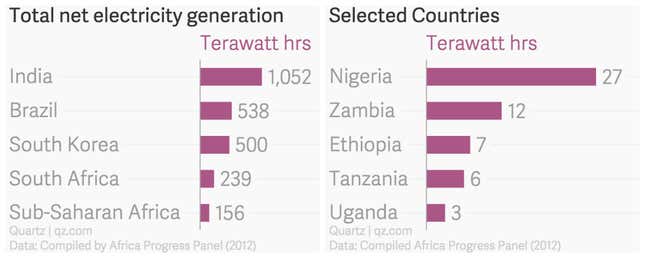A decade on from the Gleneagles Summit, Africa is undergoing a remarkable transformation. Standards of living are increasing, the middle class is set to double in the next ten years and a continent that was then a scar on the conscience of the world is now the most exciting. Africa’s challenges are still better known than its prospects; but with a digital revolution in full-swing and data revolution underway, African nations have a chance to leapfrog stages of development.
In the early 90s, average growth in sub-Saharan Africa was around -2%. Nearly two-thirds of external finance came from aid, while exports were just $700 million. Today, 10 of the 15 fastest growing economies are in Africa, with countries such as Kenya, Rwanda and Ghana growing by 6%-8% a year, exports are more than $150 billion and aid makes up around a fifth of external finance.
There has also been an explosion in the growth of digital technologies. There are now 650 million mobile phone subscribers on the continent – a more than 40-fold increase since 2000. In countries such as Nigeria, mobile phone ownership among adults is the same as it is in the US. This growth far exceeds growth in access to basic services. But mobile technology is now simply universal personal technology – and it has the potential to revolutionise the delivery of services in Africa, both in the private and public sector.
This change is profound – and it is already happening. The mobile money service, M-Pesa, dramatically altered payments for goods and services in Kenya, ending queues to pay for utilities in an instant and turning the cash economy upside down. It was an innovation that had clear and immediate application for public services. Similarly mobile health services, mHealth, has the potential to radically improve health outcomes in Africa, through simple uses such as reminding patients to attend appointments or to disseminate public messaging such as those during the Ebola outbreak.
Through tapping into the world marketplace of ideas and applying existing technology to build new systems of delivery, African nations have the potential to skip traditional stages of development. But those who succeed today will not only need to continually source new ideas irrespective of where they originate, but also create new knowledge.
This is why education will be crucial. As economic power transfers to knowledge industries a nation’s human capital will determine whether it prospers or not. The global software industry, which didn’t exist a generation ago, now generates revenues of around $500 billion a year. African nations must therefore invest in the quality of their education systems and in building world-class universities, but also be open to partnerships with institutions beyond their borders.
Collaborations between countries, such Carnegie Mellon in Kigali and MIT’s Civic Design Lab in Nairobi, can transfer skills and expertise, as well as deepen understanding between students of different faiths and cultures. And new global education innovations such as massive online courses (MOOCs) have the potential to create global network effects, with the transfer of knowledge and ideas between students based in Monrovia and Munich, Freetown and Frankfurt. Such innovations could mean that the next Silicon Valley won’t be a specific location; instead it could be a global network of like-minded, open and engaged people thinking about how to create products and solutions needed in the modern economy.
However, the single most important precondition for a country’s success will be access to electricity. In a knowledge economy access to electricity – even a simple solar charger – is the foundation for everything; a game-changer. You don’t merely have the things electricity traditionally got you, but you’ve got access to technology. Roads, rail, ports and airports also all have to be connected today. This is why my foundation, the Africa Governance Initiative, made delivering electricity a major focus. We have worked with the governments of Rwanda and Sierra Leone to help turn on the lights and are now providing support to President Obama’s Power Africa initiative, which aims to deliver 60 million new power connections on the continent.

Developing this infrastructure will require partners, not just from governments and international bodies, but also from the private sector. It will also require embracing new and innovative ways of thinking. Governments are not traditionally good at innovation. But they have a key role in creating the right environment, the enabling institutions as well as encouraging receptivity to new ideas. These are the foundations on which dynamic economies are constructed, and what many African leaders are building today.
It means there is a genuine sense of optimism and opportunity in much of Africa. Despite the challenges, there is a restless spirit, a desire for progress, expression, and a belief that change is underway. The digital and data revolutions provide a chance for this change to become a reality – and, in doing so, for the future to be more evenly distributed.
Tony Blair served as Prime Minister of Great Britain and Northern Ireland from 1997 to 2007. He is the founder and Patron of the Africa Governance Initiative. We welcome your comments at africa@qz.com or @qzafrica
